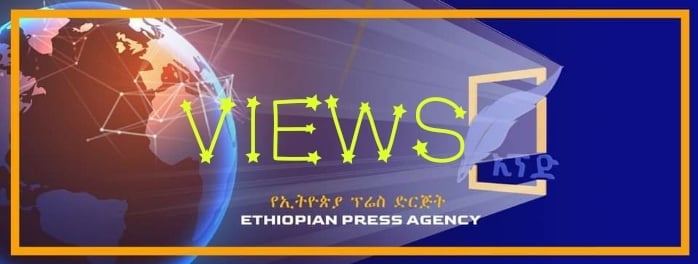
BY ABEBE WOLDEGIORGIS
The stalemate on the GERD negotiation was unresolved for long because of the lower riparian countries’ adamant stance. Ethiopia, as a sovereign State, has the right to utilize its water resources for development. As per it is common all over the world, utilizing Trans Boundary Rivers for developmental purpose should not be treated exceptionally in the case of Ethiopia.
Fortunately, we heard the news against the backdrop recently that both the Egyptian and the Sudanese presidents came to their mind and explained that, as long as the water is used for development without antagonizing the lower riparian countries interest, they are ready to settle the matter on the negotiation table.
Ethiopia, for long, has expressed its unwavering stance that the utilization of the Nile water must be based on a win-win approach with no significant harm against the riparian countries. Since the beginning of the construction of the GERD in 2011, Ethiopia invited both the Egyptian and Sudanese water engineers and officials to visit the dam site and the water map.
After their visit experts from both countries confirmed that the dam would not harm the lower riparian countries. But politicians in both countries with baseless reason and ill motives expressed their anxiety that the dam would threat their interest. According to experts, the dam rather benefits them in various aspects.
The site of the construction of the dam is located in 500 meter above sea level and as compared to the Dams in Sudan and Egypt, it has very law evaporation rate.
The GERD protects dams in the lower riparian countries from sedimentation because the soil taken by the running water from the highlands of Ethiopia during the rainy season is protected by green plantation underway aiming to safeguard the GERD in line with environmental protection. This is proved by the Tekeze dam.
It also enables the dams to enhance their power generating capacity and enables the lower riparian countries to get water in regular amount without fluctuation throughout the rainy and dry seasons.
GERD is constructed mainly for generating hydroelectric power not for farming. The water, after hitting the turbines that generated electric power, goes down through the river and will continue its flow with no reduction in volume.
Ultimately, the power generated from the dam serves not only Ethiopia but it also provides electric power to the neighboring countries that paves the way to economic integration.
Historically, Egypt claimed a hegemonic right on the utilization of the water. The 1929 unilateral agreements between Egypt and Sudan/both countries at that time were under the British protectorate/and the 1959 Nile Waters Agreement between the two countries for full control utilization of the Nile waters allowed the entire average annual flow of the Nile to be shared between the Sudan and Egypt at 18.5 and 55.5 billion cubic meters, respectively. Both agreements did not consider Ethiopia, the highest contributor of the Nile water.
Ethiopia, during the imperial era, made efforts to build hydro power dam on the Nile River. To that end, studies were conducted by the American company on the river basin but due to lack of finance and other resources, realizing the goal was not successful. Obtaining the loan from the multinational financial institutions was given red light. One of the reasons for this obstacle was Egypt’s pressure on the financial institutions to hold the money through its lobbyists.
Not only these, Egypt in order to detract Ethiopia’s attention from exploiting its natural resources such as the Nile water, pursued a clandestine activity by supporting local insurgents militarily and politically for many decades. The preoccupation of Ethiopia on fighting insurgents consumed its manpower, finance and time and ultimately left the nation pauperized.
Egypt’s covert activities witnessed here when the wars broke out in the 1960s and 1970s in the northern and eastern parts of the country.
Ethiopia is a country with 115 million inhabitants. The main stay of the nation’s economy is agriculture in which 80 percent of the population earns its living. The sector is rain fed and subsistence. In the time of drought, crop failure is common. Hence, unless the economy is modernized and structurally changed ensuring food security and attaining growth will be a day dreaming.
One of the major strategies of the government to transform the economy is shifting the stranded agricultural labor in to the non farming sector such as the manufacturing and service sector. Realizing this ambition needs sufficient energy which the nation lacks at the moment.
Currently, manufacturing and other businesses are mushrooming and to some extent, they are creating job opportunities to thousands but due to power interruption, they produce bellow their production capacity which in turn brought draw back on the economic growth. Hence, in order to alleviate power shortage, exploring and exploiting the water resource is a must and natural right. Living by foreign handouts when the agriculture fails due to extreme weather conditions is a humiliating practice. Therefore, halting it by any means is the task of the current generation.
Ethiopia contributes 86 percent water to the Nile River and the other upper riparian countries contribute only 14 percent and Egypt 0 percent but its claim to use 100 percent of the water is unacceptable and injustice.
No upper riparian country was asked or consulted when Egypt built Aswan Dam in the 1950s. The dam constructed in the lowest point of the land and the aridness of the place aggravates wastage of water through evaporation.
The extensive rice farms established in the river banks are highly water consuming. Its agricultural farms are stretched to in the arid zone of the western part of the country and by now Egypt is the major exporter of agricultural products to the Middle East and European countries.
Egypt is known by its rich resource in underground water which has a potential to be exploited for the coming thousand years. But when it comes to the construction of GERD, Egypt irrationally antagonizes the project.
Apart from its media propaganda, it tried to rally the upper riparian countries against Ethiopia’s water development scheme in contrary with the Cooperative Framework Agreement signed by the 11 members of riparian countries in 2011.
Egypt nullified Ethiopia’s offer to settle the dispute many times and rejected the initiative forwarded by the upper riparian countries to reach agreement in a peaceful manner.
A year ago for instance, the African Union accepted a proposal forwarded by Ethiopia to deal with the matter under its auspicious but both Egypt and Sudan, instead of taking as a good opportunity created by the plat form, they took the case to the United States and latter on to the United Nation Security Council aiming to impose their will by manipulating the UN with their lobbyists though it was in vain.
Weeks ago, the Ethiopian Minister of Water, Irrigation and Energy, Dr. Engineer Sileshi Bekele defeated his rivals at the United Nations Security Council in the diplomatic battle.
He unequivocally told the participants: “Ethiopia is constructing the GERD to electrify its 65 million people’s homes in which currently living in absolute darkness. We are building a hydropower dam not a nuclear plant and better the Security Council not to west its time by meddling in the internal affairs of Ethiopia.”
Sileshi further said that Ethiopia contributes 74 billion cubic meter of water to the river. And when it impounds water during the second dam filling, it holds only 13 billion cubic meter of water in the reservoir which has no negative impact on the flow of the water and the lower riparian countries.
Now, Ethiopia accomplished the second phase of filling the dam and months later the two turbines will begin to generate hydroelectric power. By accepting the reality on the ground Egypt and Sudan must come to the negotiation table to solve African problem by Africans disregarding their demand for binding agreement as there is no way for it.
Editor’s Note: The views entertained in this article do not necessarily reflect the stance of The Ethiopian Herald
The Ethiopian Herald July 31/2021



